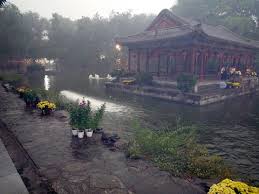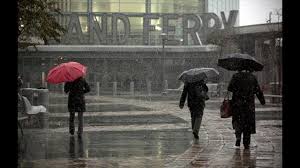“Cu nvm.” So say the Trung, as they refer to a particular type of rain, “the rain that falls when hunters are soon to return.”* The Trung live in Yunnan province in China; the language itself is one of many dying languages. According to one study, of the close to 7,000 world languages, approximately 50-90% will be gone by the year 2100. These figures are startling and saddening, and raise a large number of cultural questions.
But what does Trung rain have to do with writing? How does it affect me, granted a rather small way to look at things? My first response was to the sheer beauty and unusualness of the word. Reading it shifted my usual way of seeing things. It woke me up.
Rain is not only a natural phenomenon. It is also a cultural one. For the Trung, or, more likely, their ancestors, hunting is central enough to merit a word for a type of rain, one which is experienced only when hunters are about to return. We also hear something else in that word for rain — the desire for one’s loved ones to return. Rain filled with longing.
We also hear language working, turning and shifting upon itself, until it articulates just the right and culturally nuanced message. Not just “rain” or “sprinkles” or “showers” but a word that swells with hunger, desire, history, terrain, an image from the last hunt when your husband was mauled by the claws of a tiger: The rain that falls when hunters are soon to return.
Rain, its beauty and strangeness. Since I’m listening as a cultural outsider, the name for rain sounds differently in my ears than it does in the ears of a native Trung speaker. For me, the word rain has become defamiliarized. I hear the word slowly. I hear it poetically. That which has been taken for granted, in language and the world, has shifted to center stage in my consciousness.
Rain, a word in my novel. I’m currently taking a short novel through its zillionth draft. The novel takes place in NYC. In a few scenes, it’s raining. The hunters, though, are not coming home. There are no hunters. It’s contemporary NY, actually Staten Island. How do I describe the rain so that it has the same impact for the reader as the Trung word for rain? Right now, as it sits in my novel, rain slides prosaically and barely noticed. How do I prolong the rain, the word or words for it?
Maybe I should just let it rain and be done with it.
Not every word and sentence needs to be defamiliarized and not every drop of rain or tree leaf needs to be seen with new eyes or in a prolonged fashion. Sometimes we, our sentences and paragraphs and novels, just need to get on with things. On my walk to the bank later today, I can’t pause at every interesting pebble or gaze into every puddle nor, if they were making the same walk, can my characters. There are, after all, accounts to be transferred, bills to be paid. On page such and such, a character needs to be able to get out of her car and walk to the front door by the end of a brief sentence. (We’re much more interested in what will happen once she steps through that door and sees. . . .)
But now and then our sentences need to be slowed and our perceptions need to be more than automatic. Perception and the physical world, to borrow from Shklovsky who coined the term defamiliarization, needs to be made more aesthetic. We need prose to make it through a day, but we also need poetry to deepen it. We need Trung rain. Now and then, language and the world must “appear strange and wonderful” (Shklovsky quoting Aristotle).
The task is to decide when and why — to what purpose. How does the moment of shifted perception finally matter to our novels and to the characters within them? After all, the Trung don’t think about their word for rain; its simply part of how things are for them. But still. . . . When rain shifts, when a word shifts into something slow and rich and full of depth, into what new world are we stepping?
*Ross Perlin, “Vng Gyey Svr: How to Read the Dictionary of an Endangered Language,” Harper’s, August 2013.
Mark Karlins




Lovely. I remember reading Milan Kundera talking about the Czech word “litost” which he believes has no equivalent word in any other language. His own take on it’s meaning is “a state of torment created by the sudden sight of one’s own misery.” It’s wonderful what other languages give us and sad when they disappear. Mark Abley wrote a very good book called “Spoken Here: Travels among Threatened Languages.”
Thanks Mark. Karlins, that is (but also Abley).
Great quote from Kundera : misery within misery. I must find a way to use “litost” during conversation. (Haven’t read the Abley but will get a hold of it.)
What a beautiful post, Mark. Trung Rain – I love.
Thanks, Martine.
Mark,
I read this post three times. It’s so lovely. “We need prose to make it through a day, but we also need poetry to deepen it. We need Trung rain.” So true. I will never think of rain the same way. Thank you.
Thanks so much.
This is a wonderful post, Mark. It’s so true that an unfamiliar word (or a word defamiliarized) can suddenly swell “with hunger, desire, history, terrain.” Trang rain – something to remember. Thanks.
TRUNG rain, that is!
That’s it, isn’t it, Julie? “Something to remember” : one of these days I’d love to hear more of your thoughts on memory, nature, poetry, that is, if you have a few moments.
Julie, I’m sure you just hopped, momentarily onto the rong train of thought.
Oh, I LOVE this, Mark. It reminds me of the way the Eskimo language is weighted with synonyms for “snow.”I suppose that clusters of words like this in a language reveal a particular society’s obsessions and passions. I wondered, after reading your post, which word in English has the most synonyms: there turn out to be two, “good” and “drunk.” Make of that what you will…
Thanks, Louise. I almost included various names of snow in my blog and then decided that I’d better leave the piece when the leaving was still good. I have heard, though, that there really aren’t quite as many names for snow as had once been reported. One way or the other, I love those names: green snow, pink snow, snow sparkling with moonlight, snow falling on water. . . . Even the scientific names for snow are pretty wonderful: needles, rimed snow, firn, penitents. . . .
Louise, have to jump in immediately and correct that old saw about the Eskimo language having many words for snow. It isn’t true. They have no more than four. Most Eskimo speaking groups will only admit to two words equivalent to our word snow. Eskimo-Aleut tongues are agglutinative languages in which adjectival and verbal bits are added in strings on to a basic stem so that many word-clumps are more like our equivalent of sentences.
Tim, our responses to Louise must have passed each other in cyberspace. That’s what I had heard too about the words for snow. What I wonder about, though, is what do we do with those supposed words for snow or, maybe as important, how do we think about our desire for those words, with all their nuances, to exist. We must need those words. But maybe they should be placed in poems or in the mouths of fictional characters rather than being placed in the mouths of actual people who we imagine, for our own purposes, in a certain (exotic) way.
Mark and Tim, I beg to differ. And so do the latest studies: http://www.washingtonpost.com/national/health-science/there-really-are-50-eskimo-words-for-snow/2013/01/14/e0e3f4e0-59a0-11e2-beee-6e38f5215402_story.html.
Beside this interesting debate, which seems to have been resolved in favor of an “old saw,” I’d like to hark back to my main point, which was that Mark’s piece encouraged me to think about culture and word clusters and what they say about us. Thanks again, Mark!
Thanks, Louise. I enjoyed reading the article and I enjoyed being able to change my mind. The world feels richer now that those words have returned, not, of course, that they ever left. And I did take your larger point about culture and language. Amazing how one gets sidetracked.
Mark
It’s raining here this morning. Quiet rain. And I am compelled to post my favorite poem.
O WESTERN wind, when wilt thou blow
The small rain down can rain?
Christ, that my love were in my arms
And I in my bed again!
Leda, I’ve always loved that poem. It sings itself.
It also always remind me of this lovely line:
“Nobody, not even the rain, has such small hands.”
Good news, Louise, with regards to all those words for snow. I’m happy to lose this argument — if it ever was one — and agree with Mark that the world is a better (if colder) place for having so many words to describe that white stuff I’m so happy to see gone, for another year. Thanks!
Sad to say, we could probably add a snow word the Inuit and Yupik don’t have; a word that means, “that gray, pockmarked sludge that accumulates at the side of the road after a zillion cars have whizzed by the snow bank left by a plow.” I’m with you, Tim!